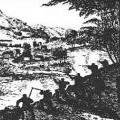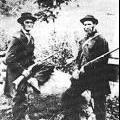 In the 1860s, many Irishmen living in the United States wanted Britain to grant independence to Ireland. Ireland was under English rule and most of its people lived in severe poverty. The Irish potato famine of the 1840s had decimated Ireland's population and England had offered little help. Thousands of Irish families migrated to North America in search of a better life.
In the 1860s, many Irishmen living in the United States wanted Britain to grant independence to Ireland. Ireland was under English rule and most of its people lived in severe poverty. The Irish potato famine of the 1840s had decimated Ireland's population and England had offered little help. Thousands of Irish families migrated to North America in search of a better life.
Between 1847 and 1861, over two million Irish crossed the Atlantic. Many Irish, both in America and in Ireland, were bitter towards England, and sought independence for Ireland. A radical group known as the Fenian Brotherhood was formed. Their aim was to take Canada hostage and force England to grant independence to Ireland.
 In 1866, the Fenians launched a series of raids on Canadian territory. One was at Pigeon Hill, on the Quebec-Vermont border. Led by a man named "General" Samuel Spear, several hundred Fenians marched six miles into Canada, where they planted a bright green flag. A small Canadian force saw them coming, but wisely retreated. The Fenians met no soldiers, so they busied themselves by stealing chickens, pigs, or liquor from farms in the area. A veritable armed mob, they plundered nearby St. Armand and Frelighsburg (Slab City), and, it was said, "insulted and abused" the local population. On hearing that Canadian reinforcements were approaching, the Fenians began a disorganized retreat to the U.S. The last 200 stragglers were charged by a volunteer cavalry troop who managed to capture sixteen prisoners. Once back on American soil, the Fenians had their guns confiscated by American soldiers.
In 1866, the Fenians launched a series of raids on Canadian territory. One was at Pigeon Hill, on the Quebec-Vermont border. Led by a man named "General" Samuel Spear, several hundred Fenians marched six miles into Canada, where they planted a bright green flag. A small Canadian force saw them coming, but wisely retreated. The Fenians met no soldiers, so they busied themselves by stealing chickens, pigs, or liquor from farms in the area. A veritable armed mob, they plundered nearby St. Armand and Frelighsburg (Slab City), and, it was said, "insulted and abused" the local population. On hearing that Canadian reinforcements were approaching, the Fenians began a disorganized retreat to the U.S. The last 200 stragglers were charged by a volunteer cavalry troop who managed to capture sixteen prisoners. Once back on American soil, the Fenians had their guns confiscated by American soldiers.
Another raid occurred in 1870 at Eccles Hill (not far from Pigeon Hill), when 400 Fenians under the command of "General" John O'Neill, President of the Fenian Brotherhood, were repulsed by a much smaller group of Canadian home-guard and militiamen who were waiting there to meet them. Two Fenians were killed and nine were injured. No Canadians were hurt or killed. O'Neill's words to his troops were these: "Men of Ireland, I am ashamed of you."